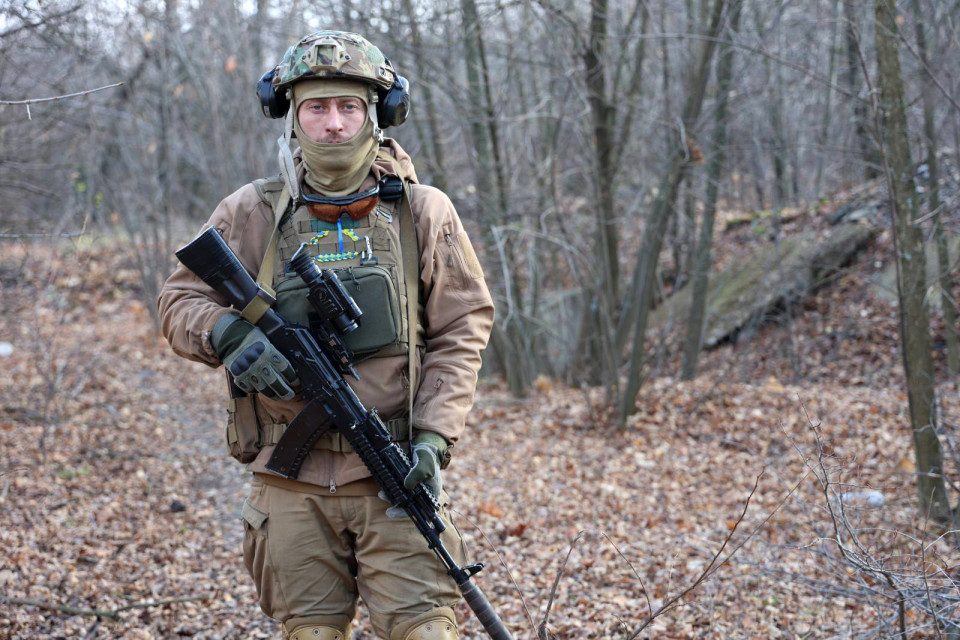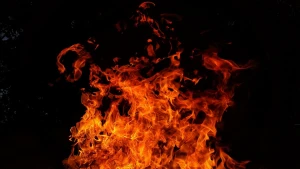
Heroes Of Ukraine. There is desire to punch Russians in the teeth to roll them back to their steppes - Ivan Bilyk, a soldier of 24th Royal brigade
Ivan Bilyk, with the call sign Yaz, is a squad commander in the mechanised battalion of the 24th King Danylo brigade. For the first time, the man went to the front in 2014. Then he left a good job abroad and a successful life and joined the Ukrainian Armed Forces
The story of a warrior who has been fighting at the front since 2014 is told by Espreso channel.
He left a successful business abroad to protect Ukraine from Russians
Ivan Bilyk, with the call sign Yaz, is a squad commander in the mechanised battalion of the 24th King Danylo brigade. For the first time, the man went to the front in 2014. Then the man left a good job abroad and a successful life to join the Ukrainian Armed Forces.
"You can sit abroad and explain to everyone that you are a wonderful Ukrainian. But another option is to pack a bag and go to defend Ukraine," he is convinced.
Ivan Bilyk is not a professional soldier but served in the 80th Airborne Assault Brigade.
"I had an excellent experience of military service," says Ivan Bilyk. - Then we made experimental battalions without "hazing" and there were excellent instructors. Sometimes, we could make many shots from firearms and several from grenade launchers during one night. I mastered the whole set of weapons then."
The soldier in civilian life lived between Poland and Sweden. He was engaged in transportation and had his own small taxi company abroad. He was quite successful, but he left everything, came from abroad and came to the military enlistment office.
"There is a sense of patriotism," says Ivan Bilyk. - When I arrived in Sweden, I was very surprised. They have a flagpole in almost every house. I look at them and understand that people have built their state. At that time, it became clear that we needed to break out from under this Russian yoke to live like this. I learned a lot in Sweden: the patriotism of people and the vision that you can live at home and not anywhere else. In 2014, I joined the army with great patriotism, I hoped everything would work out quickly for us. Unfortunately, that didn't happen."
Then the defender fought in almost all points in the Donetsk and Luhansk regions. Volnovakha, Dovzhansk, Zelenopillia – the most prominent positions of the warrior 24th brigade. Ivan Bilyk says that there were tough fights then. One was at 32 checkpoints from October 13 to October 28, 2014. Then the Ukrainian defenders had to break through the Russian ring to deliver ammunition and food for their sworn brothers.
"They had very well-secured positions on the left flank," recalls Yaz. - They broke our left flank, but on the right — they survived. We left in the morning, the Russian forces did not expect this and we managed to strike them quickly. Their first line was smashed to smithereens. We had a six-hour fight. At a certain point, we gained a foothold, delivered food and ammunition, and then there was a command to withdraw."
The Russians had a significant advantage in everything. And all the points that could not be taken were turned into ashes
A year later, Ivan was discharged and returned abroad to his civilian profession. He admits that even then, he noticed that there would be no more particularly active military operations. But on February 24 of this year, the plans changed. During the full-scale invasion, the soldier returned to his homeland to fight the Russian forces.
"Then almost no one went to Ukraine. Everyone left instead," Ivan notes. - I arrived home and the next day, I immediately appeared at the military enlistment office and instantly went to the brigade. Then you could say, they say, what I will change there, nothing depends on me alone. But I realised that everyone could say that and no one will come. My conscience wouldn't let me say no. You can live abroad, but later it may happen that there will be nowhere to return."
When the full-scale Russian invasion of Ukraine began, the soldier got to Popasna. Tough battles continued there for several months. According to Ivan Bilyk, the enemy was dominated by the number of infantry and artillery. The city was turned to ashes.

Photo: 24 separate mechanized brigade of the Ukrainian Armed Forces
"There is a house, and they destroyed it and all the houses nearby," says Yaz. "They don't care if civilians were there. They mixed the ground with concrete. It was hard, there were infantry battles. It was also difficult because there were short infantry battles and the Russians were retreating. And then they started pouring artillery. I went to Popasna twice. We got out of position the first time and had to gain a foothold on another point. But at that time, we were shelled and a shooting battle began. As I was retreating, covering the way for my friend, an explosion occurred near me. I lost consciousness and woke up at night. It was tough to return to our people because the enemy began to change into our clothes and it was difficult to identify where was ours and where was the enemy’s. And the second time, when I went to Popasna, I was pinned down by a piece of wall in battle and ended up in the hospital."
During the liberation of the Kherson region, there was a turning point in this war
A few months in the hospital and the soldier again went to the front line. Ivan returned to his positions at a time when the counteroffensive in the Kharkiv region was continuing. The man's brigade was in the Kherson region then, so he returned to defend this front sector. According to the man, most combat Russian units were stationed in the positions of the South because they were waiting for the offensive of the Ukrainian Armed Forces.
"Do you remember the period when our media massively said that the first mass strike would be in the Kherson region? The Russians believed this and there were Russian specialists in the South," says the warrior. - So all this worked. They were not waiting for us in the Kharkiv region. Very competent work of the commanders and the General Staff. The Russians were deceived and attacked. Then came the domino principle. The enemies began to transfer troops from the Kherson region, and the same blow was in the Kherson region. There came a turning point when we realised that the enemy is not as terrible as it is described. There are a lot of them, but they are afraid and do not make sudden movements. They have much more weapons than we do, mechanised units, but they do not use their capabilities out of fear. They lost confidence in their command. It was clear that they would no longer be the same as in winter."
During the counteroffensive, Ivan took part in liberating settlements in the Kherson region. Despite Russia's superiority in weapons and men, the soldiers performed difficult work and could even hold large front sections.
"The three of us held two kilometres of the front," says Yaz. - It's hard for so many people, but we succeeded. I was pleasantly surprised. The Russian forces tried to do us various dirty tricks, but we gave them a light. We had good interaction between the units, unlike the Russian army. For example, when they started to push equipment or sabotage and reconnaissance groups to us, we immediately worked them out correctly with mortars. We didn't make a commotion. We saw it and immediately started pouring it from a long distance. Still, we kept this moment of composure, let it get closer, then brought the coordinates and started working on them with a mortar battery, which showed itself very well in these moments."
According to Ivan Bilyk, the big problem of Russians is that they have different nationalities. Therefore, there is chaos in their ranks. This is a severe disadvantage, which will not help them conduct active military operations. In addition, they tried to influence people with fear. But this also turned out the other way around and caused negative emotions in the occupied territories.
"I'm already fed up with it. There is a desire to give the Russians a punch in the teeth so they roll back to their steppes and do not come to us. Build a fence and forget about them. We are at home and fighting to live in a free and independent Ukraine," Ivan Bilyk is convinced.
- News












































